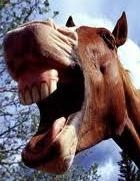Horsezone News
Having Teeth Trouble? Ask Dr Paul!
 Not sure what's going on inside your horse's mouth? Is he spilling feed and throwing a tantrum when you ask for contact with the bit? Sounds like it could be teeth trouble!
Not sure what's going on inside your horse's mouth? Is he spilling feed and throwing a tantrum when you ask for contact with the bit? Sounds like it could be teeth trouble!
This month we ask Horsezone’s consulting vet, Dr Paul Hatten BVSc, about the importance of caring properly for horses’ teeth.
Dr Paul advises that all young horses should have their teeth inpsected by a trained professional prior to commencement of training, at about 2 years of age. This will ensure that if there are any problems with the teeth, they can be eliminated prior to bitting up and therefore prevent damage to the lips or inside of the cheeks during mouthing.
As 3 – 4 year olds there is alot going on in a horse’s mouth with caps coming off molars and Dr Paul recommends having ridden and performance horses’ mouths checked at least every 6 months, especially if there are any abnormalities to the mouth eg: overbite. This once again prevents damage to the inside of the cheeks, as the caps can become very sharp when they are ready to fall off and can cause issues with a horse’s health and work. In the wild, a horse’s caps fall off naturally, however, with ridden horses it is important to monitor what is going on in their mouths for optimum training and performance.
On the subject of wolf teeth, Dr Paul advises that he would remove these, usually between 3 ½ to 4 years of age on a ridden horse, especially if they are growing at an angle or are forward enough to interfere with the bit.
At around 4 ½ years a horse’s bridle teeth will come in (usually only in colts and geldings, these are rare in mares) and the corner incisors will grow, so the top and bottom teeth meet, at approximately 5 years old. This is when a horse has a full set of teeth and the caps should be completely gone off the molars. Horses teeth grow their whole lives(until they are very old, when they tend to fall out) and it is a well known fact that a knowledgeable person can tell the age of a horse by their teeth - thus the saying "don't look a gift horse in the mouth", because he could be so old his teeth are about to fall out!
Dr Paul recommends checking your horse’s teeth every 9 – 10 months until they are 5 years of age and from then on make a point of having them maintained yearly.
TIP: always organise to have your horse’s teeth treated and yearly vaccinations (tetnus and strangles) administered at the same time each year, this makes it easier to remember when these important health care tasks are due.
To tell immediately if a horse’s teeth need attention, only if you are confident putting your hand in his mouth, run your fingers up along the bottom edge of the top teeth at the back of the jaw and feel if there are sharp points, which could cut the inside of the cheek. If you are not confident doing this, it is better to consult a professional to do this for you, rather than get yourself bitten!
Signs your horse may need his teeth attended to include:
- Dropping feed when chewing
- Weight loss
- Bad breath – could be a sign of decaying food stuck in the teeth
- Displays of irritation in the mouth ie: teeth grinding
- Resistance to the bit and obvious discomfort when being ridden including , throwing head in the air, head shaking and constant chewing of the bit
If you are unsure if your horse’s teeth need attention, be sure to consult a professional in your area for their advice and help.
News Search
Categories
- General
- Event Results
- Stallionzone
- Sponsored Shows
- Clubs
- Health
- Feature Horses
- Competitions
- Five Minutes With Horsezone
- Young Riders
- Reviews
- Training and Clinics
- Postcards from the saddle
- 2014 Equitana by HORSE FIRST
- 2013 Equitana
- 2012 Equitana
- 2012 London
- 2011 Equitana
- 2011 Queensland Floods
- 2010 WEG
